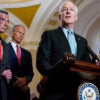In a speech on the Senate floor last night, Sen. Ted Cruz lambasted legislation that tied aid to Ukraine with changes to how much the United States gives to the International Monetary Fund.
“These IMF provisions, if passed into law, would dramatically expand the financial exposure of the United States of America, effectively doubling our contribution, expanding our exposure,” said the Texas Republican.
“We should not be opening up the U.S. taxpayers to billions in additional financial liability without a debate on the merits,” Cruz added. “It shouldn’t be just tied to Ukranian aid and forced through the Senate. That’s the wrong approach.”
He also said the “so-called reforms … would diminish U.S. influence on the IMF, would reduce our abilities to control the decisions of the IMF” and “would expand Russia’s influence and control over the IMF.”
Heritage Foundation’s Terry Miller explained the history of the IMF changes earlier this week:
Believing that the U.S. wielded too much power at the IMF, in 2010 several developing countries initiated negotiations to restructure the organization. These nations demanded a reduction in the U.S. quota and voting power, as well as an election to select the U.S. representative to the IMF board. Unfortunately, the Obama Administration acquiesced to each of these demands.
“This agreement was a bad deal in 2010—a fact implicitly acknowledged by the Administration’s three-year delay in submitting it to Congress,” Miller wrote. “Now, in 2014, it’s still a bad deal.”





























One Reply to “WATCH: Cruz Explains in Under Two Minutes Why Ukraine Aid and IMF Changes Shouldn’t Be in Same Bill”